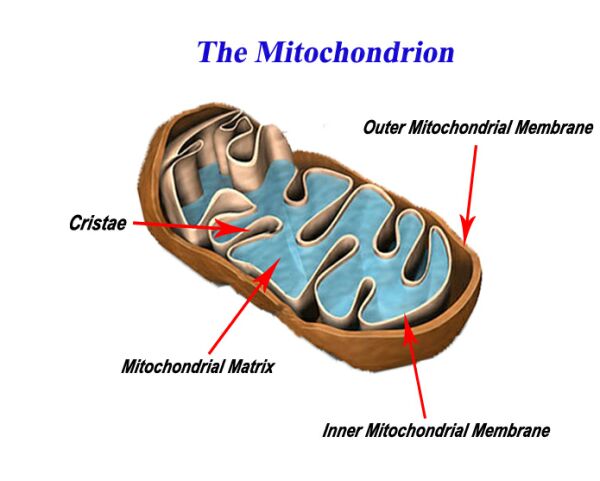"This means," says Nuland, "that even if we count only those molecules present in amounts of more than 50,000 each, the total is still a very minimum of 100 million protein molecules in each cell. Such a staggering figure gives some idea of the swarming immensity of biochemical activity within us."
“這意味著,”紐蘭說,“即使我們只統(tǒng)計(jì)那些每一種的數(shù)量在5萬以上的分子,每一個(gè)細(xì)胞中所包含的蛋白質(zhì)分子總數(shù)最少有l(wèi)億個(gè)。這是一個(gè)驚人的數(shù)字,我們從中可以了解一點(diǎn)我們體內(nèi)生物化學(xué)活動(dòng)的劇烈程度。”
It is all an immensely demanding process. Your heart must pump 75 gallons of blood an hour, 1,800 gallons every day, 657,000 gallons in a year—that's enough to fill four Olympicsized swimming pools—to keep all those cells freshly oxygenated. (And that's at rest. During exercise the rate can increase as much as sixfold.) The oxygen is taken up by the mitochondria. These are the cells' power stations, and there are about a thousand of them in a typical cell, though the number varies considerably depending on what a cell does and how much energy it requires.
這種活動(dòng)所消耗的能量也是十分巨大的。你的心臟每小時(shí)必須輸出約340升血液,每天則要輸出8000多升,每年輸出300萬升——這足以裝滿4個(gè)標(biāo)準(zhǔn)的奧林匹克游泳池——以使所有細(xì)胞獲得新鮮的氧氣。(這是指在休息的時(shí)候,如果做劇烈運(yùn)動(dòng),這個(gè)數(shù)字還要增加至6倍)。氧氣被線粒體吸收,它們是細(xì)胞的發(fā)電站。一個(gè)細(xì)胞里一般有大約1000個(gè)這樣的發(fā)電站,其具體數(shù)目根據(jù)細(xì)胞所做的事情及所需的能量的不同而有很大差異。

You may recall from an earlier chapter that the mitochondria are thought to have originated as captive bacteria and that they now live essentially as lodgers in our cells, preserving their own genetic instructions, dividing to their own timetable, speaking their own language. You may also recall that we are at the mercy of their goodwill. Here's why. Virtually all the food and oxygen you take into your body are delivered, after processing, to the mitochondria, where they are converted into a molecule called adenosine triphosphate, or ATP.
你大概還記得,我們?cè)谇懊嫣岬剑瑩?jù)認(rèn)為。線粒體原先是被俘獲的細(xì)菌,如今是我們細(xì)胞中的寄居者。它們保留了自己的基因指令,按照自己的時(shí)間表來分裂,操自己的語言。你也會(huì)記得,多虧它們的好心照料,我們才得以安康。為什么這么說?因?yàn)槟銛z入體內(nèi)的幾乎所有食物和氧氣經(jīng)過加工后都被輸送給線粒體,然后由它們將其轉(zhuǎn)換為一種名為三磷酸腺苷的分子,也就是ATP。
You may not have heard of ATP, but it is what keeps you going.
你可能沒聽說過ATP,但正是它使你身體運(yùn)轉(zhuǎn)正常。












